Financial Ethics and FASEA Code of Ethics Analysis
VerifiedAdded on 2022/09/22
|13
|3674
|31
Report
AI Summary
This report examines the ethical responsibilities of financial advisors, focusing on the FASEA Code of Ethics and its implications. The assignment analyzes a case study involving a financial advisor, Sam, and her interactions with clients, highlighting violations of ethical standards related to client protection and informed consent. It discusses potential barriers to ethical decision-making, such as cognitive biases and financial background assumptions, recommending strategies to improve ethical conduct. The report also addresses record-keeping obligations and the importance of maintaining accurate financial records, as mandated by the FASEA Code, to ensure transparency and accountability in financial advising. The report provides recommendations for financial advisors to improve their ethical practices and better serve their clients.
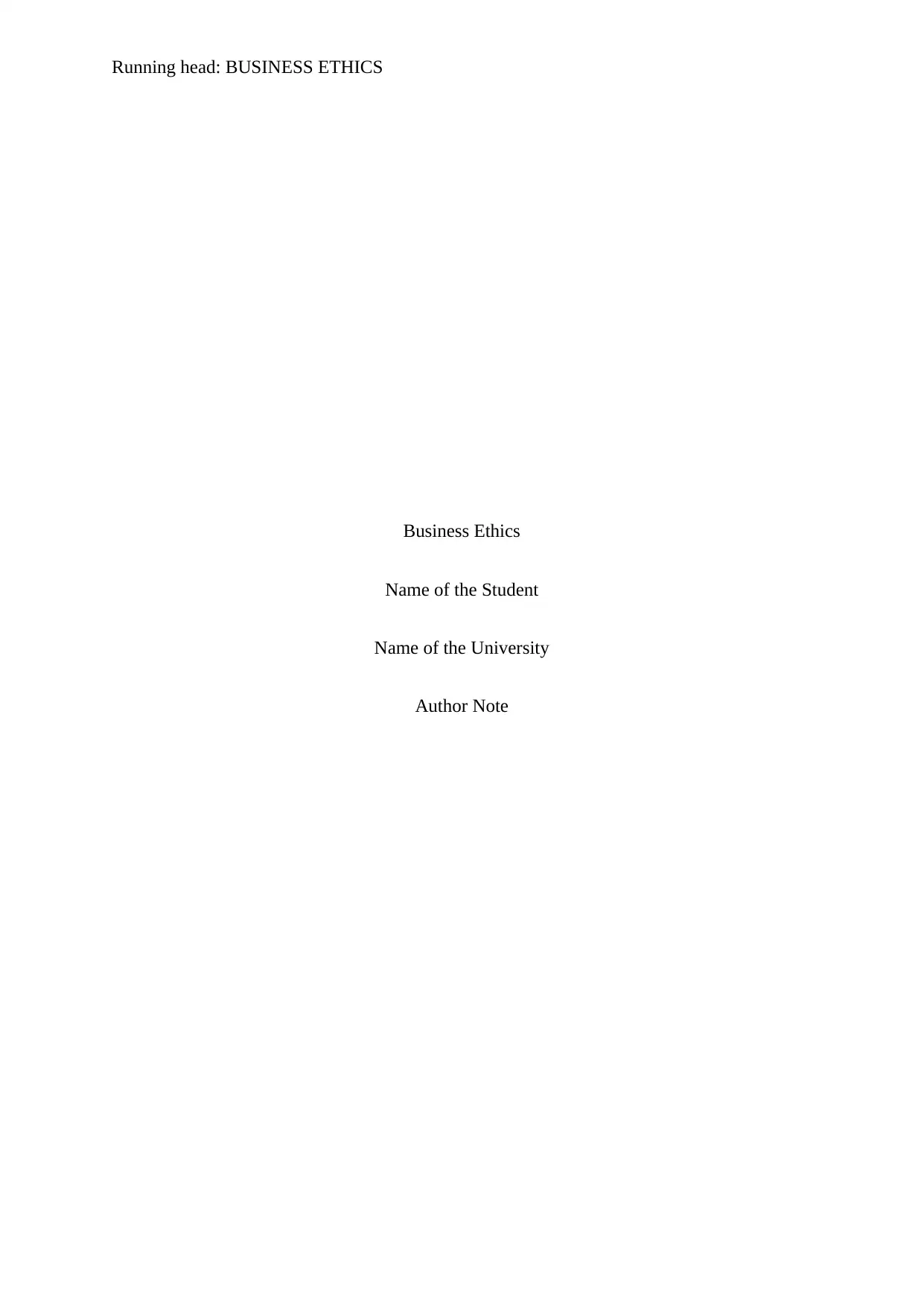
Running head: BUSINESS ETHICS
Business Ethics
Name of the Student
Name of the University
Author Note
Business Ethics
Name of the Student
Name of the University
Author Note
Paraphrase This Document
Need a fresh take? Get an instant paraphrase of this document with our AI Paraphraser
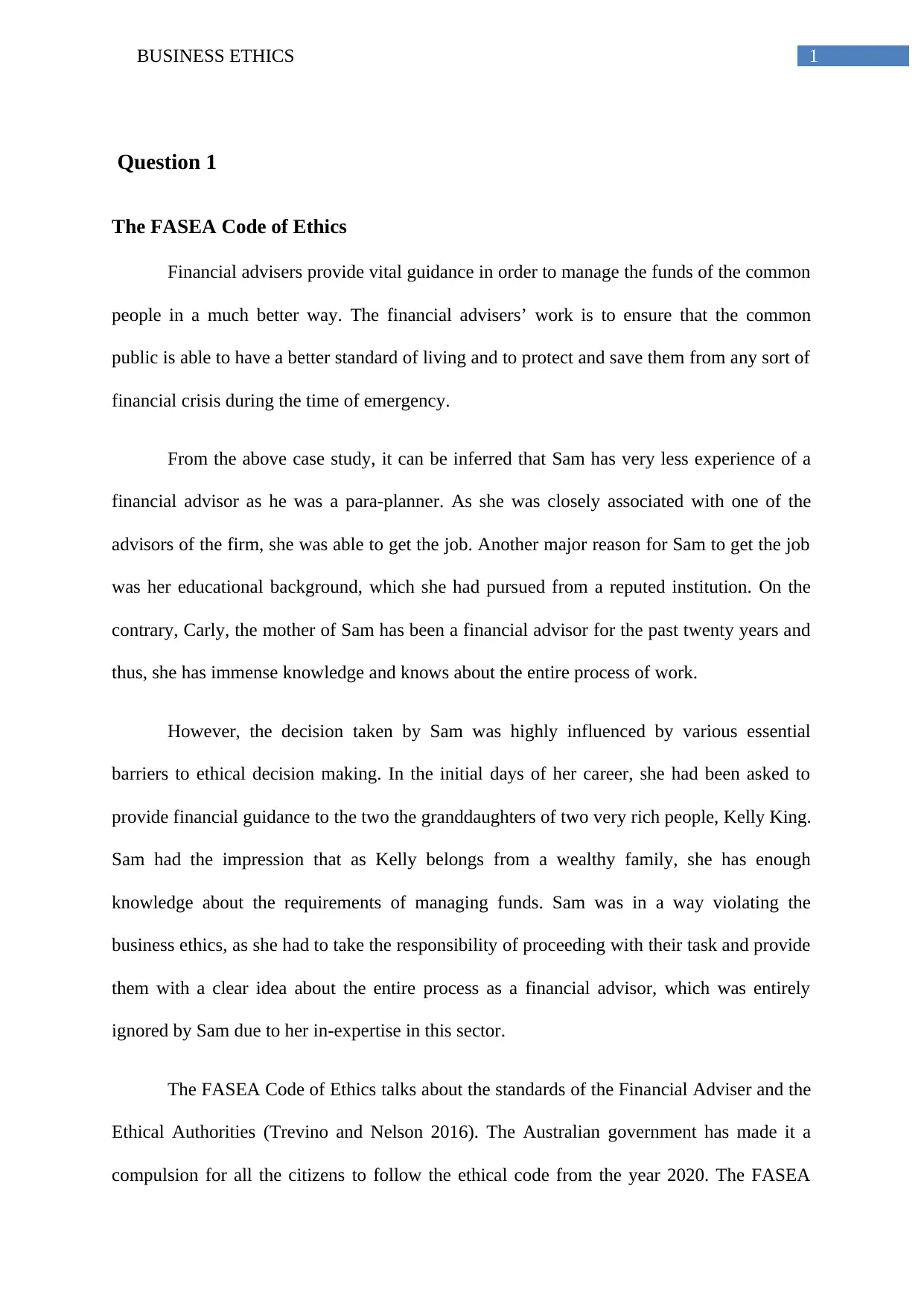
1BUSINESS ETHICS
Question 1
The FASEA Code of Ethics
Financial advisers provide vital guidance in order to manage the funds of the common
people in a much better way. The financial advisers’ work is to ensure that the common
public is able to have a better standard of living and to protect and save them from any sort of
financial crisis during the time of emergency.
From the above case study, it can be inferred that Sam has very less experience of a
financial advisor as he was a para-planner. As she was closely associated with one of the
advisors of the firm, she was able to get the job. Another major reason for Sam to get the job
was her educational background, which she had pursued from a reputed institution. On the
contrary, Carly, the mother of Sam has been a financial advisor for the past twenty years and
thus, she has immense knowledge and knows about the entire process of work.
However, the decision taken by Sam was highly influenced by various essential
barriers to ethical decision making. In the initial days of her career, she had been asked to
provide financial guidance to the two the granddaughters of two very rich people, Kelly King.
Sam had the impression that as Kelly belongs from a wealthy family, she has enough
knowledge about the requirements of managing funds. Sam was in a way violating the
business ethics, as she had to take the responsibility of proceeding with their task and provide
them with a clear idea about the entire process as a financial advisor, which was entirely
ignored by Sam due to her in-expertise in this sector.
The FASEA Code of Ethics talks about the standards of the Financial Adviser and the
Ethical Authorities (Trevino and Nelson 2016). The Australian government has made it a
compulsion for all the citizens to follow the ethical code from the year 2020. The FASEA
Question 1
The FASEA Code of Ethics
Financial advisers provide vital guidance in order to manage the funds of the common
people in a much better way. The financial advisers’ work is to ensure that the common
public is able to have a better standard of living and to protect and save them from any sort of
financial crisis during the time of emergency.
From the above case study, it can be inferred that Sam has very less experience of a
financial advisor as he was a para-planner. As she was closely associated with one of the
advisors of the firm, she was able to get the job. Another major reason for Sam to get the job
was her educational background, which she had pursued from a reputed institution. On the
contrary, Carly, the mother of Sam has been a financial advisor for the past twenty years and
thus, she has immense knowledge and knows about the entire process of work.
However, the decision taken by Sam was highly influenced by various essential
barriers to ethical decision making. In the initial days of her career, she had been asked to
provide financial guidance to the two the granddaughters of two very rich people, Kelly King.
Sam had the impression that as Kelly belongs from a wealthy family, she has enough
knowledge about the requirements of managing funds. Sam was in a way violating the
business ethics, as she had to take the responsibility of proceeding with their task and provide
them with a clear idea about the entire process as a financial advisor, which was entirely
ignored by Sam due to her in-expertise in this sector.
The FASEA Code of Ethics talks about the standards of the Financial Adviser and the
Ethical Authorities (Trevino and Nelson 2016). The Australian government has made it a
compulsion for all the citizens to follow the ethical code from the year 2020. The FASEA
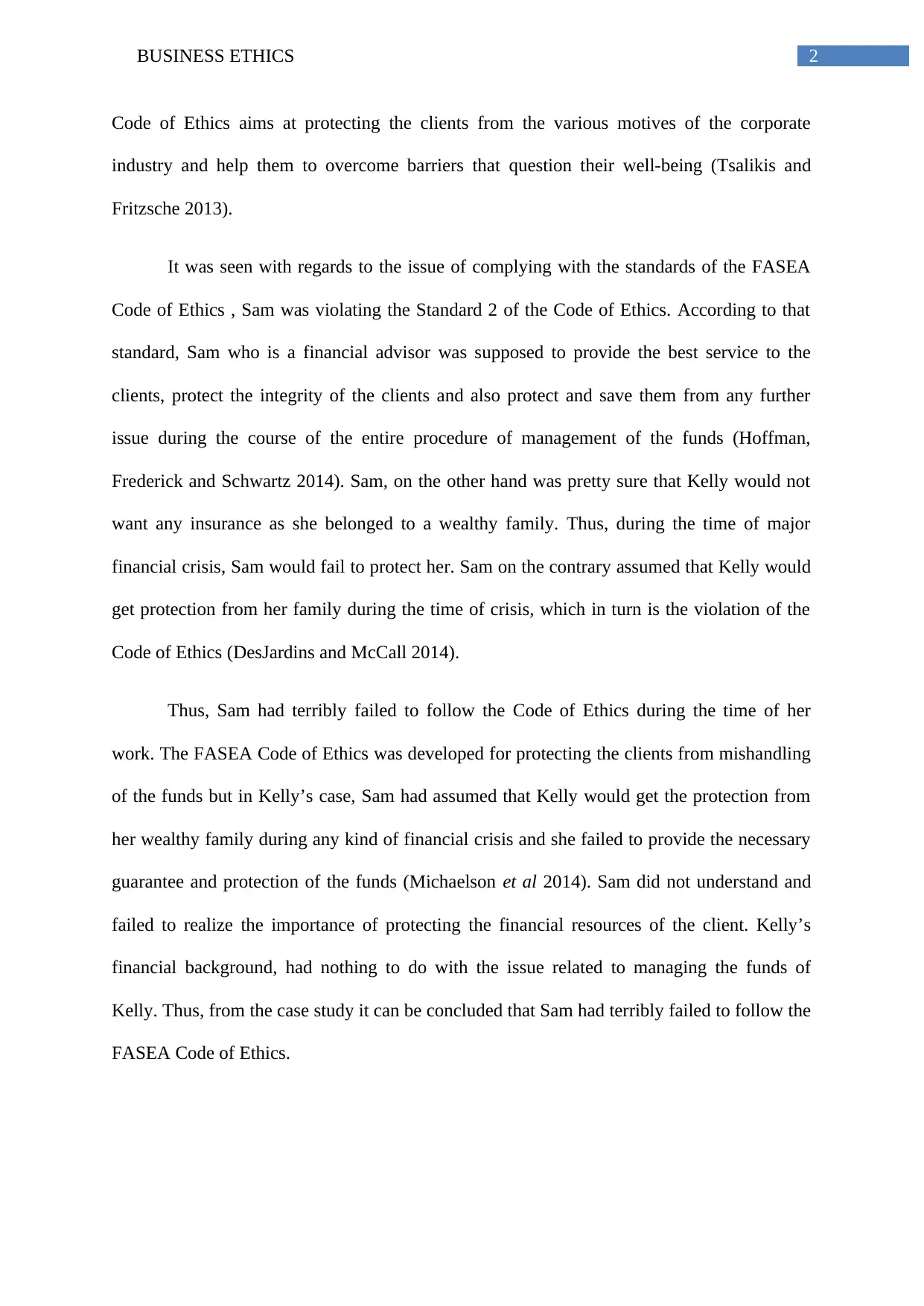
2BUSINESS ETHICS
Code of Ethics aims at protecting the clients from the various motives of the corporate
industry and help them to overcome barriers that question their well-being (Tsalikis and
Fritzsche 2013).
It was seen with regards to the issue of complying with the standards of the FASEA
Code of Ethics , Sam was violating the Standard 2 of the Code of Ethics. According to that
standard, Sam who is a financial advisor was supposed to provide the best service to the
clients, protect the integrity of the clients and also protect and save them from any further
issue during the course of the entire procedure of management of the funds (Hoffman,
Frederick and Schwartz 2014). Sam, on the other hand was pretty sure that Kelly would not
want any insurance as she belonged to a wealthy family. Thus, during the time of major
financial crisis, Sam would fail to protect her. Sam on the contrary assumed that Kelly would
get protection from her family during the time of crisis, which in turn is the violation of the
Code of Ethics (DesJardins and McCall 2014).
Thus, Sam had terribly failed to follow the Code of Ethics during the time of her
work. The FASEA Code of Ethics was developed for protecting the clients from mishandling
of the funds but in Kelly’s case, Sam had assumed that Kelly would get the protection from
her wealthy family during any kind of financial crisis and she failed to provide the necessary
guarantee and protection of the funds (Michaelson et al 2014). Sam did not understand and
failed to realize the importance of protecting the financial resources of the client. Kelly’s
financial background, had nothing to do with the issue related to managing the funds of
Kelly. Thus, from the case study it can be concluded that Sam had terribly failed to follow the
FASEA Code of Ethics.
Code of Ethics aims at protecting the clients from the various motives of the corporate
industry and help them to overcome barriers that question their well-being (Tsalikis and
Fritzsche 2013).
It was seen with regards to the issue of complying with the standards of the FASEA
Code of Ethics , Sam was violating the Standard 2 of the Code of Ethics. According to that
standard, Sam who is a financial advisor was supposed to provide the best service to the
clients, protect the integrity of the clients and also protect and save them from any further
issue during the course of the entire procedure of management of the funds (Hoffman,
Frederick and Schwartz 2014). Sam, on the other hand was pretty sure that Kelly would not
want any insurance as she belonged to a wealthy family. Thus, during the time of major
financial crisis, Sam would fail to protect her. Sam on the contrary assumed that Kelly would
get protection from her family during the time of crisis, which in turn is the violation of the
Code of Ethics (DesJardins and McCall 2014).
Thus, Sam had terribly failed to follow the Code of Ethics during the time of her
work. The FASEA Code of Ethics was developed for protecting the clients from mishandling
of the funds but in Kelly’s case, Sam had assumed that Kelly would get the protection from
her wealthy family during any kind of financial crisis and she failed to provide the necessary
guarantee and protection of the funds (Michaelson et al 2014). Sam did not understand and
failed to realize the importance of protecting the financial resources of the client. Kelly’s
financial background, had nothing to do with the issue related to managing the funds of
Kelly. Thus, from the case study it can be concluded that Sam had terribly failed to follow the
FASEA Code of Ethics.
⊘ This is a preview!⊘
Do you want full access?
Subscribe today to unlock all pages.

Trusted by 1+ million students worldwide
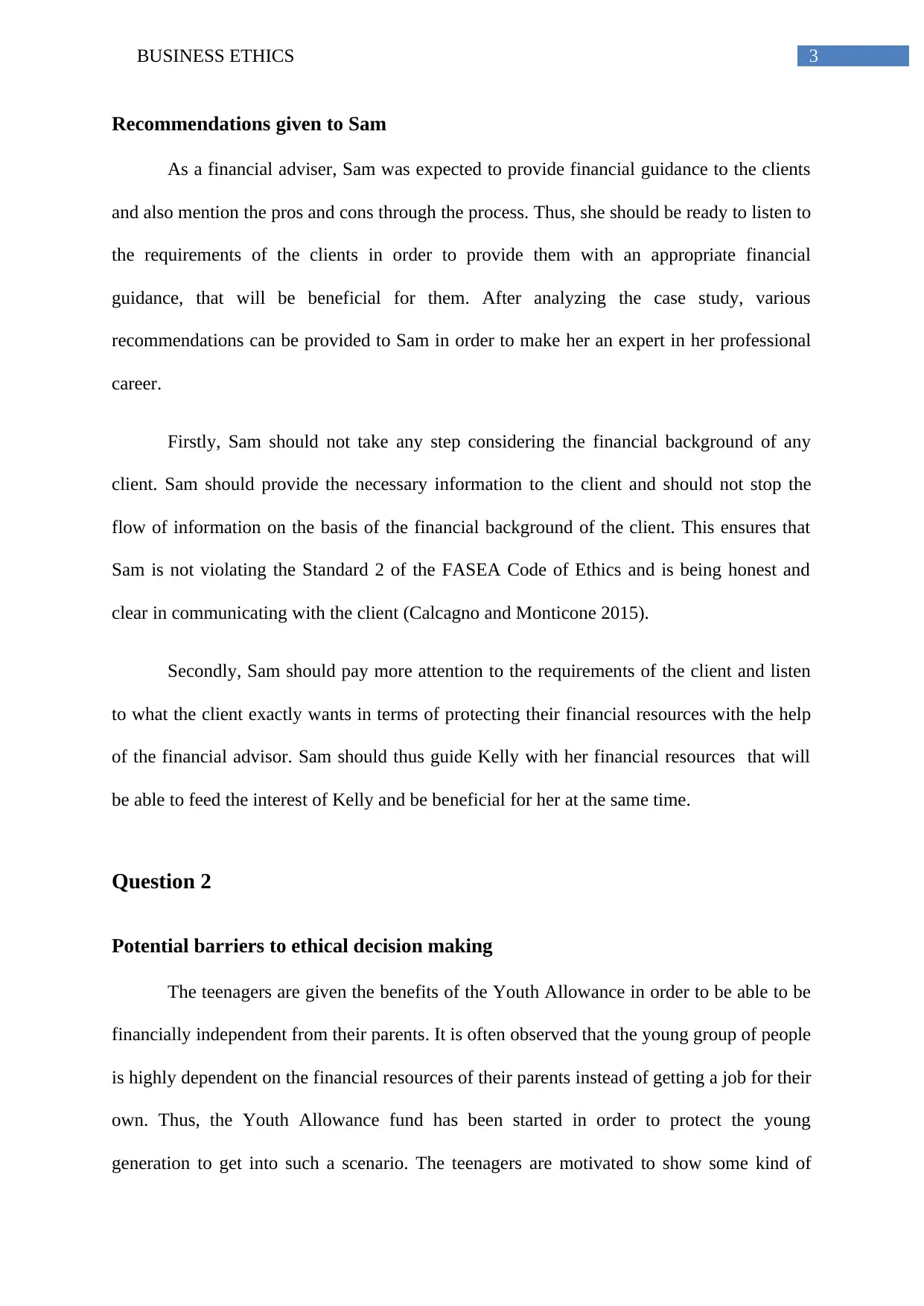
3BUSINESS ETHICS
Recommendations given to Sam
As a financial adviser, Sam was expected to provide financial guidance to the clients
and also mention the pros and cons through the process. Thus, she should be ready to listen to
the requirements of the clients in order to provide them with an appropriate financial
guidance, that will be beneficial for them. After analyzing the case study, various
recommendations can be provided to Sam in order to make her an expert in her professional
career.
Firstly, Sam should not take any step considering the financial background of any
client. Sam should provide the necessary information to the client and should not stop the
flow of information on the basis of the financial background of the client. This ensures that
Sam is not violating the Standard 2 of the FASEA Code of Ethics and is being honest and
clear in communicating with the client (Calcagno and Monticone 2015).
Secondly, Sam should pay more attention to the requirements of the client and listen
to what the client exactly wants in terms of protecting their financial resources with the help
of the financial advisor. Sam should thus guide Kelly with her financial resources that will
be able to feed the interest of Kelly and be beneficial for her at the same time.
Question 2
Potential barriers to ethical decision making
The teenagers are given the benefits of the Youth Allowance in order to be able to be
financially independent from their parents. It is often observed that the young group of people
is highly dependent on the financial resources of their parents instead of getting a job for their
own. Thus, the Youth Allowance fund has been started in order to protect the young
generation to get into such a scenario. The teenagers are motivated to show some kind of
Recommendations given to Sam
As a financial adviser, Sam was expected to provide financial guidance to the clients
and also mention the pros and cons through the process. Thus, she should be ready to listen to
the requirements of the clients in order to provide them with an appropriate financial
guidance, that will be beneficial for them. After analyzing the case study, various
recommendations can be provided to Sam in order to make her an expert in her professional
career.
Firstly, Sam should not take any step considering the financial background of any
client. Sam should provide the necessary information to the client and should not stop the
flow of information on the basis of the financial background of the client. This ensures that
Sam is not violating the Standard 2 of the FASEA Code of Ethics and is being honest and
clear in communicating with the client (Calcagno and Monticone 2015).
Secondly, Sam should pay more attention to the requirements of the client and listen
to what the client exactly wants in terms of protecting their financial resources with the help
of the financial advisor. Sam should thus guide Kelly with her financial resources that will
be able to feed the interest of Kelly and be beneficial for her at the same time.
Question 2
Potential barriers to ethical decision making
The teenagers are given the benefits of the Youth Allowance in order to be able to be
financially independent from their parents. It is often observed that the young group of people
is highly dependent on the financial resources of their parents instead of getting a job for their
own. Thus, the Youth Allowance fund has been started in order to protect the young
generation to get into such a scenario. The teenagers are motivated to show some kind of
Paraphrase This Document
Need a fresh take? Get an instant paraphrase of this document with our AI Paraphraser
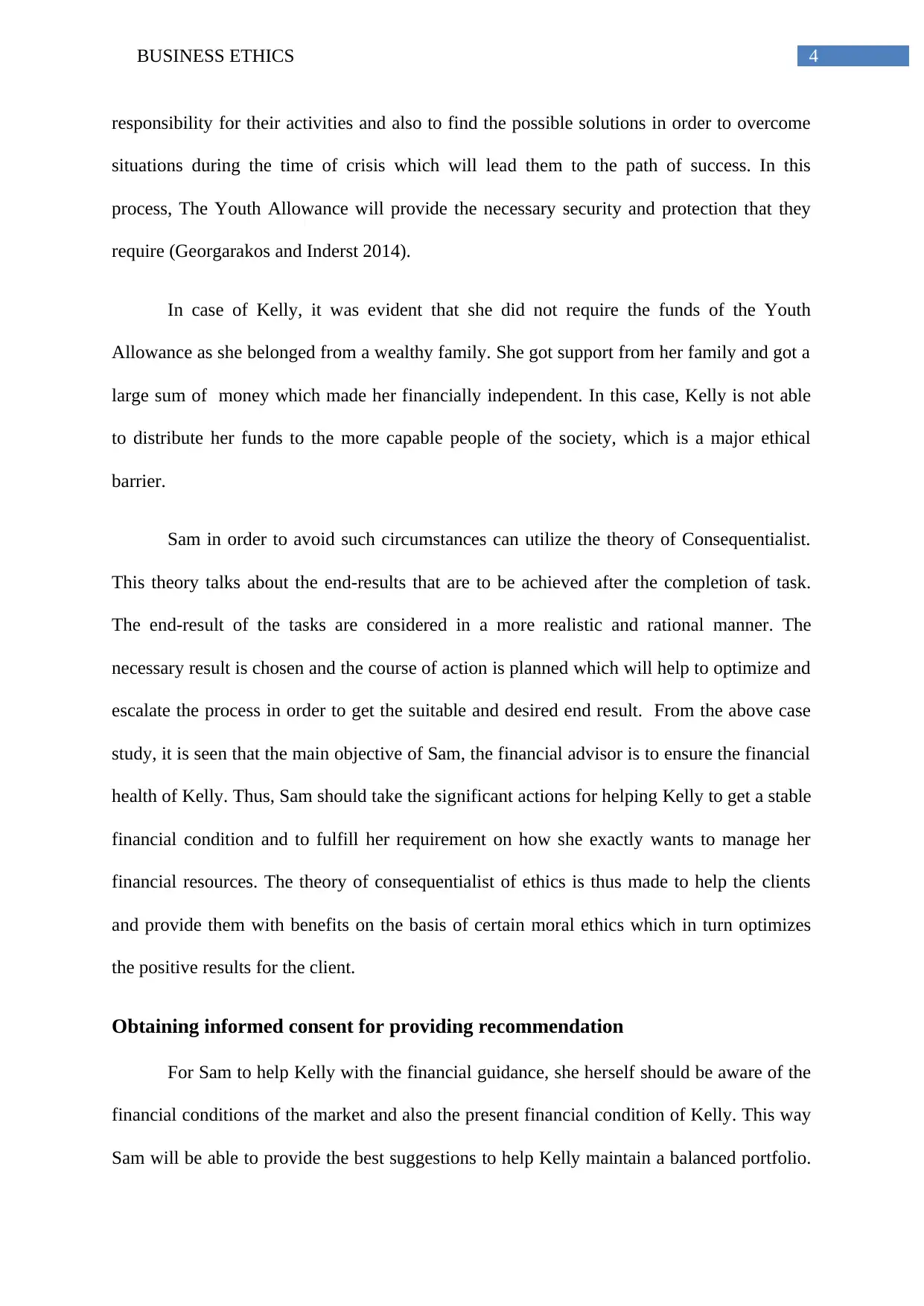
4BUSINESS ETHICS
responsibility for their activities and also to find the possible solutions in order to overcome
situations during the time of crisis which will lead them to the path of success. In this
process, The Youth Allowance will provide the necessary security and protection that they
require (Georgarakos and Inderst 2014).
In case of Kelly, it was evident that she did not require the funds of the Youth
Allowance as she belonged from a wealthy family. She got support from her family and got a
large sum of money which made her financially independent. In this case, Kelly is not able
to distribute her funds to the more capable people of the society, which is a major ethical
barrier.
Sam in order to avoid such circumstances can utilize the theory of Consequentialist.
This theory talks about the end-results that are to be achieved after the completion of task.
The end-result of the tasks are considered in a more realistic and rational manner. The
necessary result is chosen and the course of action is planned which will help to optimize and
escalate the process in order to get the suitable and desired end result. From the above case
study, it is seen that the main objective of Sam, the financial advisor is to ensure the financial
health of Kelly. Thus, Sam should take the significant actions for helping Kelly to get a stable
financial condition and to fulfill her requirement on how she exactly wants to manage her
financial resources. The theory of consequentialist of ethics is thus made to help the clients
and provide them with benefits on the basis of certain moral ethics which in turn optimizes
the positive results for the client.
Obtaining informed consent for providing recommendation
For Sam to help Kelly with the financial guidance, she herself should be aware of the
financial conditions of the market and also the present financial condition of Kelly. This way
Sam will be able to provide the best suggestions to help Kelly maintain a balanced portfolio.
responsibility for their activities and also to find the possible solutions in order to overcome
situations during the time of crisis which will lead them to the path of success. In this
process, The Youth Allowance will provide the necessary security and protection that they
require (Georgarakos and Inderst 2014).
In case of Kelly, it was evident that she did not require the funds of the Youth
Allowance as she belonged from a wealthy family. She got support from her family and got a
large sum of money which made her financially independent. In this case, Kelly is not able
to distribute her funds to the more capable people of the society, which is a major ethical
barrier.
Sam in order to avoid such circumstances can utilize the theory of Consequentialist.
This theory talks about the end-results that are to be achieved after the completion of task.
The end-result of the tasks are considered in a more realistic and rational manner. The
necessary result is chosen and the course of action is planned which will help to optimize and
escalate the process in order to get the suitable and desired end result. From the above case
study, it is seen that the main objective of Sam, the financial advisor is to ensure the financial
health of Kelly. Thus, Sam should take the significant actions for helping Kelly to get a stable
financial condition and to fulfill her requirement on how she exactly wants to manage her
financial resources. The theory of consequentialist of ethics is thus made to help the clients
and provide them with benefits on the basis of certain moral ethics which in turn optimizes
the positive results for the client.
Obtaining informed consent for providing recommendation
For Sam to help Kelly with the financial guidance, she herself should be aware of the
financial conditions of the market and also the present financial condition of Kelly. This way
Sam will be able to provide the best suggestions to help Kelly maintain a balanced portfolio.
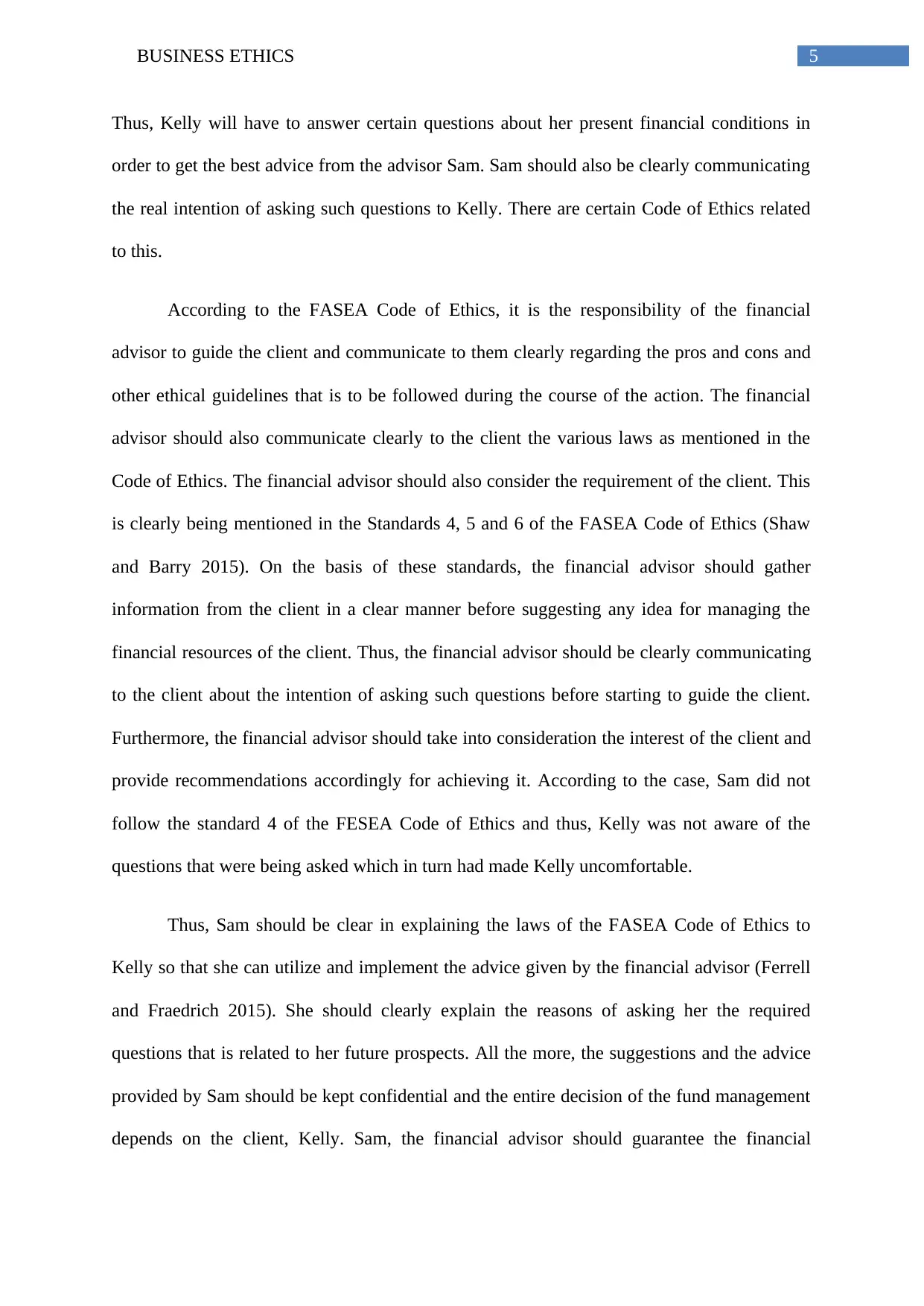
5BUSINESS ETHICS
Thus, Kelly will have to answer certain questions about her present financial conditions in
order to get the best advice from the advisor Sam. Sam should also be clearly communicating
the real intention of asking such questions to Kelly. There are certain Code of Ethics related
to this.
According to the FASEA Code of Ethics, it is the responsibility of the financial
advisor to guide the client and communicate to them clearly regarding the pros and cons and
other ethical guidelines that is to be followed during the course of the action. The financial
advisor should also communicate clearly to the client the various laws as mentioned in the
Code of Ethics. The financial advisor should also consider the requirement of the client. This
is clearly being mentioned in the Standards 4, 5 and 6 of the FASEA Code of Ethics (Shaw
and Barry 2015). On the basis of these standards, the financial advisor should gather
information from the client in a clear manner before suggesting any idea for managing the
financial resources of the client. Thus, the financial advisor should be clearly communicating
to the client about the intention of asking such questions before starting to guide the client.
Furthermore, the financial advisor should take into consideration the interest of the client and
provide recommendations accordingly for achieving it. According to the case, Sam did not
follow the standard 4 of the FESEA Code of Ethics and thus, Kelly was not aware of the
questions that were being asked which in turn had made Kelly uncomfortable.
Thus, Sam should be clear in explaining the laws of the FASEA Code of Ethics to
Kelly so that she can utilize and implement the advice given by the financial advisor (Ferrell
and Fraedrich 2015). She should clearly explain the reasons of asking her the required
questions that is related to her future prospects. All the more, the suggestions and the advice
provided by Sam should be kept confidential and the entire decision of the fund management
depends on the client, Kelly. Sam, the financial advisor should guarantee the financial
Thus, Kelly will have to answer certain questions about her present financial conditions in
order to get the best advice from the advisor Sam. Sam should also be clearly communicating
the real intention of asking such questions to Kelly. There are certain Code of Ethics related
to this.
According to the FASEA Code of Ethics, it is the responsibility of the financial
advisor to guide the client and communicate to them clearly regarding the pros and cons and
other ethical guidelines that is to be followed during the course of the action. The financial
advisor should also communicate clearly to the client the various laws as mentioned in the
Code of Ethics. The financial advisor should also consider the requirement of the client. This
is clearly being mentioned in the Standards 4, 5 and 6 of the FASEA Code of Ethics (Shaw
and Barry 2015). On the basis of these standards, the financial advisor should gather
information from the client in a clear manner before suggesting any idea for managing the
financial resources of the client. Thus, the financial advisor should be clearly communicating
to the client about the intention of asking such questions before starting to guide the client.
Furthermore, the financial advisor should take into consideration the interest of the client and
provide recommendations accordingly for achieving it. According to the case, Sam did not
follow the standard 4 of the FESEA Code of Ethics and thus, Kelly was not aware of the
questions that were being asked which in turn had made Kelly uncomfortable.
Thus, Sam should be clear in explaining the laws of the FASEA Code of Ethics to
Kelly so that she can utilize and implement the advice given by the financial advisor (Ferrell
and Fraedrich 2015). She should clearly explain the reasons of asking her the required
questions that is related to her future prospects. All the more, the suggestions and the advice
provided by Sam should be kept confidential and the entire decision of the fund management
depends on the client, Kelly. Sam, the financial advisor should guarantee the financial
⊘ This is a preview!⊘
Do you want full access?
Subscribe today to unlock all pages.

Trusted by 1+ million students worldwide
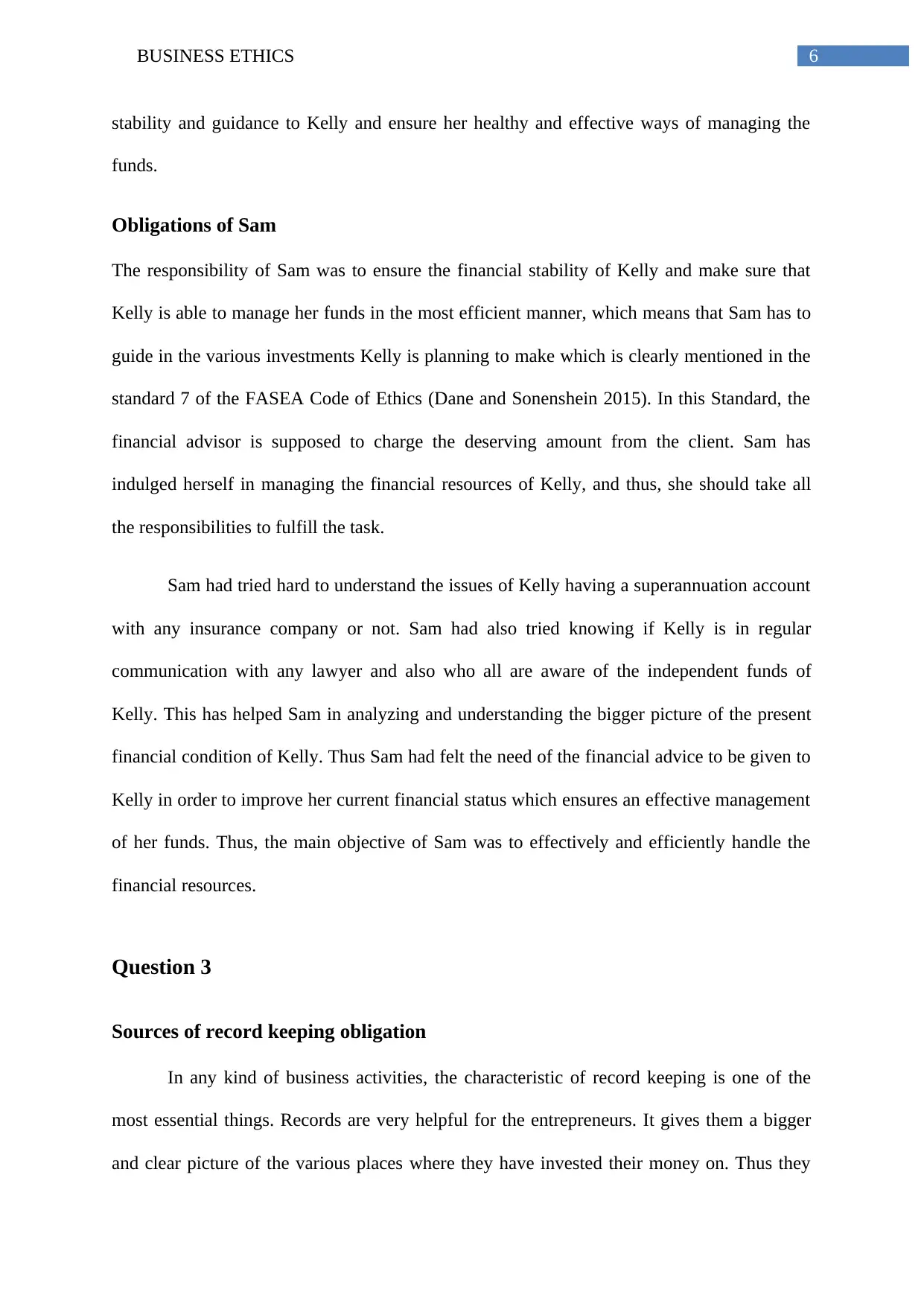
6BUSINESS ETHICS
stability and guidance to Kelly and ensure her healthy and effective ways of managing the
funds.
Obligations of Sam
The responsibility of Sam was to ensure the financial stability of Kelly and make sure that
Kelly is able to manage her funds in the most efficient manner, which means that Sam has to
guide in the various investments Kelly is planning to make which is clearly mentioned in the
standard 7 of the FASEA Code of Ethics (Dane and Sonenshein 2015). In this Standard, the
financial advisor is supposed to charge the deserving amount from the client. Sam has
indulged herself in managing the financial resources of Kelly, and thus, she should take all
the responsibilities to fulfill the task.
Sam had tried hard to understand the issues of Kelly having a superannuation account
with any insurance company or not. Sam had also tried knowing if Kelly is in regular
communication with any lawyer and also who all are aware of the independent funds of
Kelly. This has helped Sam in analyzing and understanding the bigger picture of the present
financial condition of Kelly. Thus Sam had felt the need of the financial advice to be given to
Kelly in order to improve her current financial status which ensures an effective management
of her funds. Thus, the main objective of Sam was to effectively and efficiently handle the
financial resources.
Question 3
Sources of record keeping obligation
In any kind of business activities, the characteristic of record keeping is one of the
most essential things. Records are very helpful for the entrepreneurs. It gives them a bigger
and clear picture of the various places where they have invested their money on. Thus they
stability and guidance to Kelly and ensure her healthy and effective ways of managing the
funds.
Obligations of Sam
The responsibility of Sam was to ensure the financial stability of Kelly and make sure that
Kelly is able to manage her funds in the most efficient manner, which means that Sam has to
guide in the various investments Kelly is planning to make which is clearly mentioned in the
standard 7 of the FASEA Code of Ethics (Dane and Sonenshein 2015). In this Standard, the
financial advisor is supposed to charge the deserving amount from the client. Sam has
indulged herself in managing the financial resources of Kelly, and thus, she should take all
the responsibilities to fulfill the task.
Sam had tried hard to understand the issues of Kelly having a superannuation account
with any insurance company or not. Sam had also tried knowing if Kelly is in regular
communication with any lawyer and also who all are aware of the independent funds of
Kelly. This has helped Sam in analyzing and understanding the bigger picture of the present
financial condition of Kelly. Thus Sam had felt the need of the financial advice to be given to
Kelly in order to improve her current financial status which ensures an effective management
of her funds. Thus, the main objective of Sam was to effectively and efficiently handle the
financial resources.
Question 3
Sources of record keeping obligation
In any kind of business activities, the characteristic of record keeping is one of the
most essential things. Records are very helpful for the entrepreneurs. It gives them a bigger
and clear picture of the various places where they have invested their money on. Thus they
Paraphrase This Document
Need a fresh take? Get an instant paraphrase of this document with our AI Paraphraser
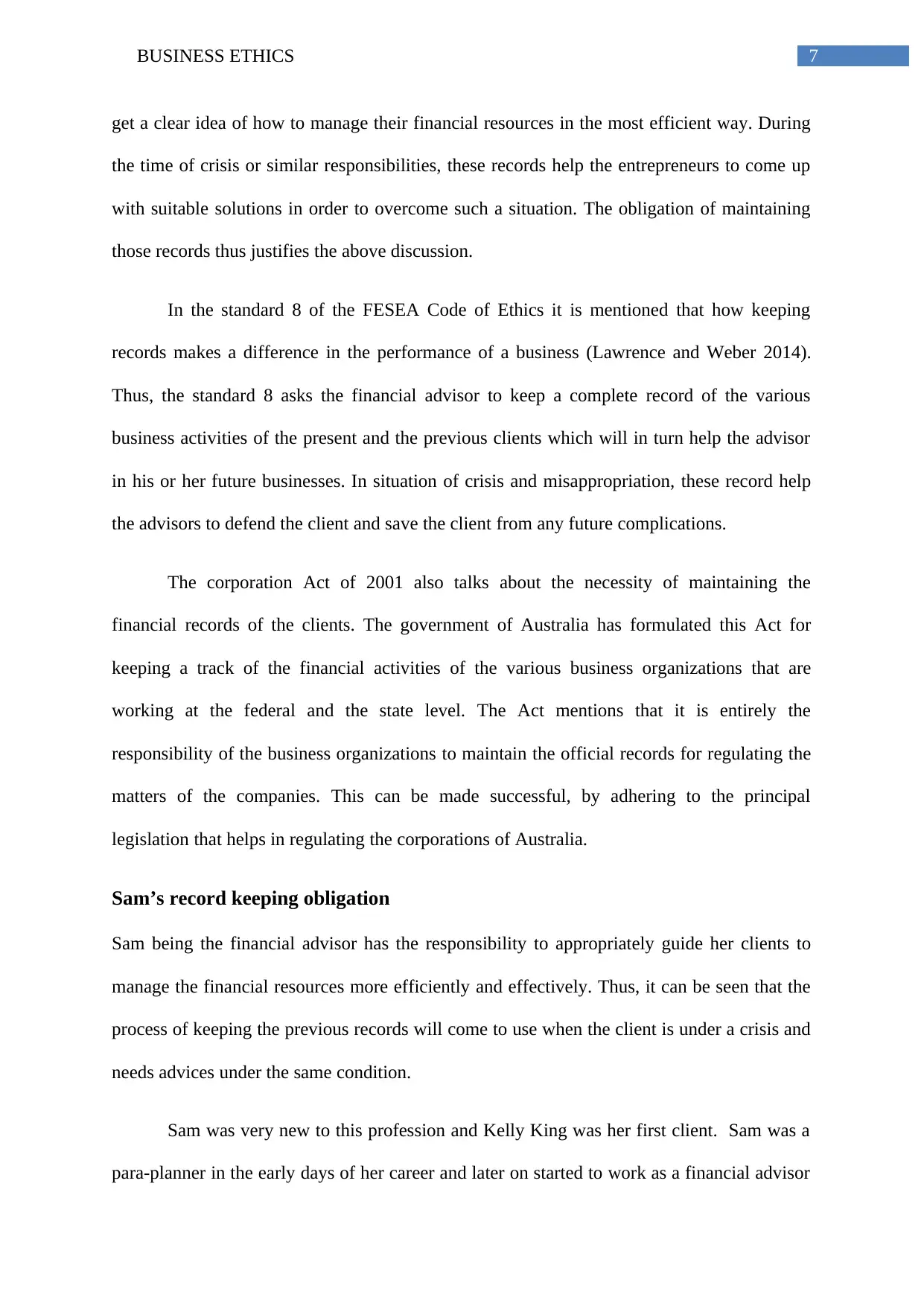
7BUSINESS ETHICS
get a clear idea of how to manage their financial resources in the most efficient way. During
the time of crisis or similar responsibilities, these records help the entrepreneurs to come up
with suitable solutions in order to overcome such a situation. The obligation of maintaining
those records thus justifies the above discussion.
In the standard 8 of the FESEA Code of Ethics it is mentioned that how keeping
records makes a difference in the performance of a business (Lawrence and Weber 2014).
Thus, the standard 8 asks the financial advisor to keep a complete record of the various
business activities of the present and the previous clients which will in turn help the advisor
in his or her future businesses. In situation of crisis and misappropriation, these record help
the advisors to defend the client and save the client from any future complications.
The corporation Act of 2001 also talks about the necessity of maintaining the
financial records of the clients. The government of Australia has formulated this Act for
keeping a track of the financial activities of the various business organizations that are
working at the federal and the state level. The Act mentions that it is entirely the
responsibility of the business organizations to maintain the official records for regulating the
matters of the companies. This can be made successful, by adhering to the principal
legislation that helps in regulating the corporations of Australia.
Sam’s record keeping obligation
Sam being the financial advisor has the responsibility to appropriately guide her clients to
manage the financial resources more efficiently and effectively. Thus, it can be seen that the
process of keeping the previous records will come to use when the client is under a crisis and
needs advices under the same condition.
Sam was very new to this profession and Kelly King was her first client. Sam was a
para-planner in the early days of her career and later on started to work as a financial advisor
get a clear idea of how to manage their financial resources in the most efficient way. During
the time of crisis or similar responsibilities, these records help the entrepreneurs to come up
with suitable solutions in order to overcome such a situation. The obligation of maintaining
those records thus justifies the above discussion.
In the standard 8 of the FESEA Code of Ethics it is mentioned that how keeping
records makes a difference in the performance of a business (Lawrence and Weber 2014).
Thus, the standard 8 asks the financial advisor to keep a complete record of the various
business activities of the present and the previous clients which will in turn help the advisor
in his or her future businesses. In situation of crisis and misappropriation, these record help
the advisors to defend the client and save the client from any future complications.
The corporation Act of 2001 also talks about the necessity of maintaining the
financial records of the clients. The government of Australia has formulated this Act for
keeping a track of the financial activities of the various business organizations that are
working at the federal and the state level. The Act mentions that it is entirely the
responsibility of the business organizations to maintain the official records for regulating the
matters of the companies. This can be made successful, by adhering to the principal
legislation that helps in regulating the corporations of Australia.
Sam’s record keeping obligation
Sam being the financial advisor has the responsibility to appropriately guide her clients to
manage the financial resources more efficiently and effectively. Thus, it can be seen that the
process of keeping the previous records will come to use when the client is under a crisis and
needs advices under the same condition.
Sam was very new to this profession and Kelly King was her first client. Sam was a
para-planner in the early days of her career and later on started to work as a financial advisor
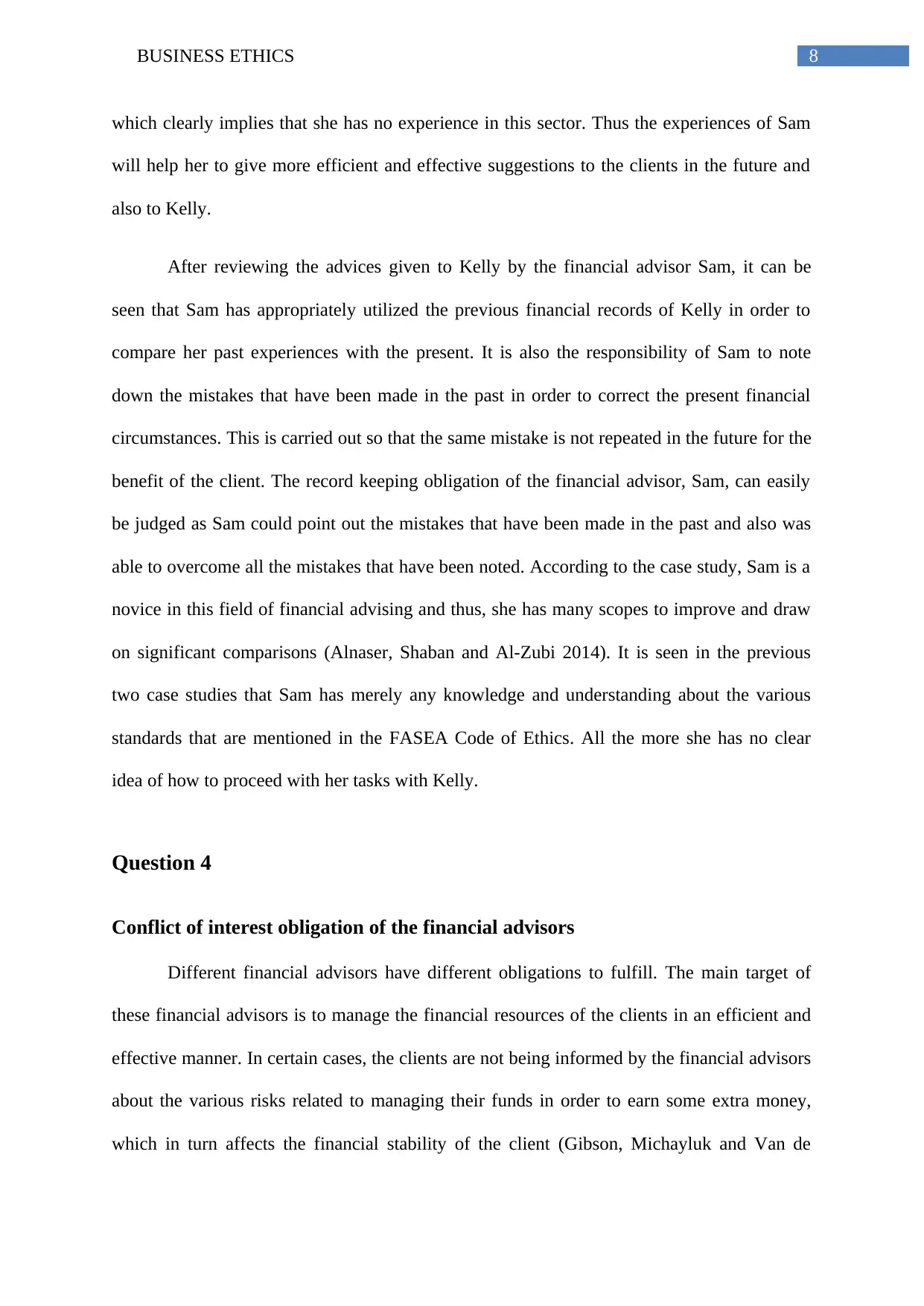
8BUSINESS ETHICS
which clearly implies that she has no experience in this sector. Thus the experiences of Sam
will help her to give more efficient and effective suggestions to the clients in the future and
also to Kelly.
After reviewing the advices given to Kelly by the financial advisor Sam, it can be
seen that Sam has appropriately utilized the previous financial records of Kelly in order to
compare her past experiences with the present. It is also the responsibility of Sam to note
down the mistakes that have been made in the past in order to correct the present financial
circumstances. This is carried out so that the same mistake is not repeated in the future for the
benefit of the client. The record keeping obligation of the financial advisor, Sam, can easily
be judged as Sam could point out the mistakes that have been made in the past and also was
able to overcome all the mistakes that have been noted. According to the case study, Sam is a
novice in this field of financial advising and thus, she has many scopes to improve and draw
on significant comparisons (Alnaser, Shaban and Al-Zubi 2014). It is seen in the previous
two case studies that Sam has merely any knowledge and understanding about the various
standards that are mentioned in the FASEA Code of Ethics. All the more she has no clear
idea of how to proceed with her tasks with Kelly.
Question 4
Conflict of interest obligation of the financial advisors
Different financial advisors have different obligations to fulfill. The main target of
these financial advisors is to manage the financial resources of the clients in an efficient and
effective manner. In certain cases, the clients are not being informed by the financial advisors
about the various risks related to managing their funds in order to earn some extra money,
which in turn affects the financial stability of the client (Gibson, Michayluk and Van de
which clearly implies that she has no experience in this sector. Thus the experiences of Sam
will help her to give more efficient and effective suggestions to the clients in the future and
also to Kelly.
After reviewing the advices given to Kelly by the financial advisor Sam, it can be
seen that Sam has appropriately utilized the previous financial records of Kelly in order to
compare her past experiences with the present. It is also the responsibility of Sam to note
down the mistakes that have been made in the past in order to correct the present financial
circumstances. This is carried out so that the same mistake is not repeated in the future for the
benefit of the client. The record keeping obligation of the financial advisor, Sam, can easily
be judged as Sam could point out the mistakes that have been made in the past and also was
able to overcome all the mistakes that have been noted. According to the case study, Sam is a
novice in this field of financial advising and thus, she has many scopes to improve and draw
on significant comparisons (Alnaser, Shaban and Al-Zubi 2014). It is seen in the previous
two case studies that Sam has merely any knowledge and understanding about the various
standards that are mentioned in the FASEA Code of Ethics. All the more she has no clear
idea of how to proceed with her tasks with Kelly.
Question 4
Conflict of interest obligation of the financial advisors
Different financial advisors have different obligations to fulfill. The main target of
these financial advisors is to manage the financial resources of the clients in an efficient and
effective manner. In certain cases, the clients are not being informed by the financial advisors
about the various risks related to managing their funds in order to earn some extra money,
which in turn affects the financial stability of the client (Gibson, Michayluk and Van de
⊘ This is a preview!⊘
Do you want full access?
Subscribe today to unlock all pages.

Trusted by 1+ million students worldwide
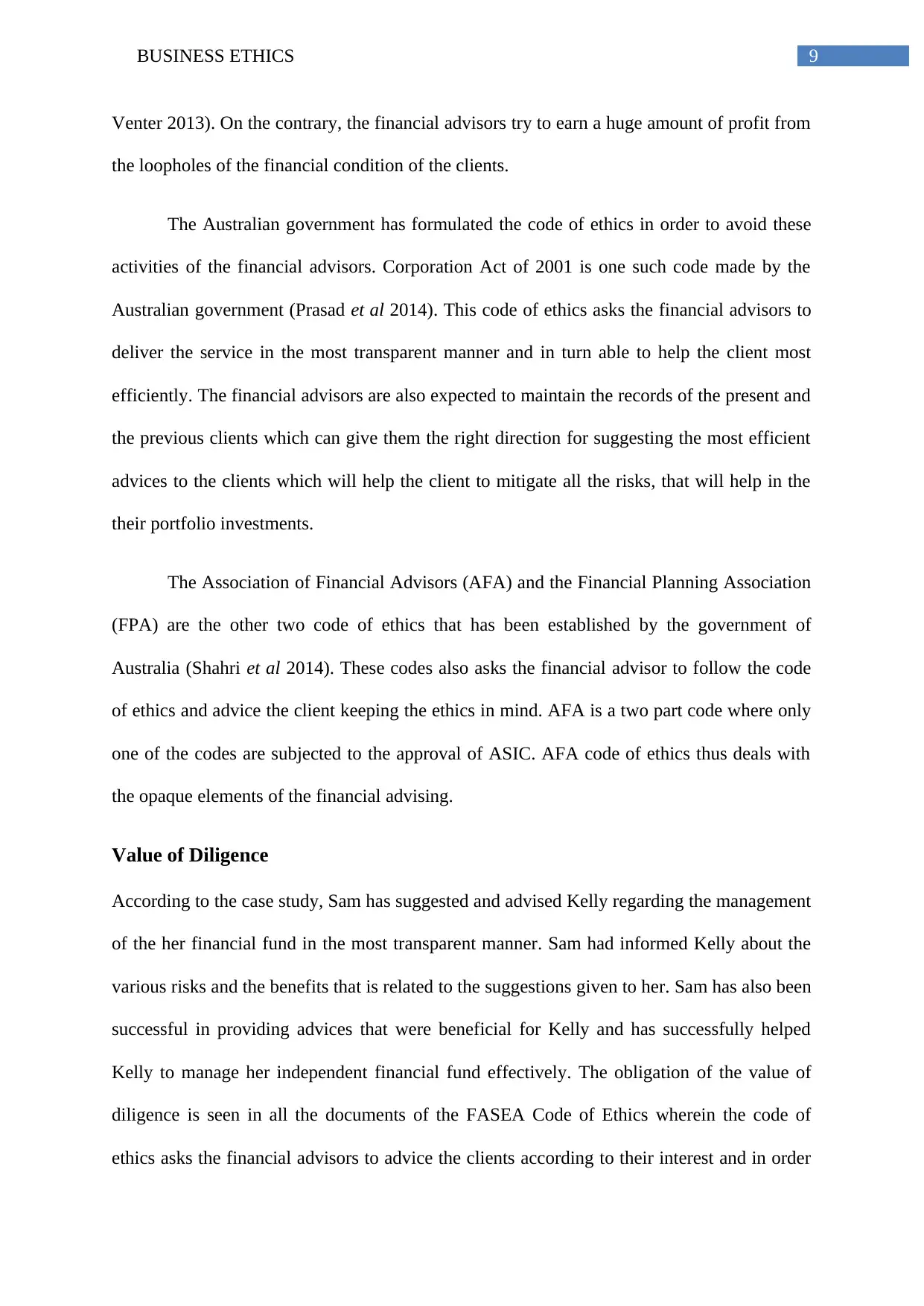
9BUSINESS ETHICS
Venter 2013). On the contrary, the financial advisors try to earn a huge amount of profit from
the loopholes of the financial condition of the clients.
The Australian government has formulated the code of ethics in order to avoid these
activities of the financial advisors. Corporation Act of 2001 is one such code made by the
Australian government (Prasad et al 2014). This code of ethics asks the financial advisors to
deliver the service in the most transparent manner and in turn able to help the client most
efficiently. The financial advisors are also expected to maintain the records of the present and
the previous clients which can give them the right direction for suggesting the most efficient
advices to the clients which will help the client to mitigate all the risks, that will help in the
their portfolio investments.
The Association of Financial Advisors (AFA) and the Financial Planning Association
(FPA) are the other two code of ethics that has been established by the government of
Australia (Shahri et al 2014). These codes also asks the financial advisor to follow the code
of ethics and advice the client keeping the ethics in mind. AFA is a two part code where only
one of the codes are subjected to the approval of ASIC. AFA code of ethics thus deals with
the opaque elements of the financial advising.
Value of Diligence
According to the case study, Sam has suggested and advised Kelly regarding the management
of the her financial fund in the most transparent manner. Sam had informed Kelly about the
various risks and the benefits that is related to the suggestions given to her. Sam has also been
successful in providing advices that were beneficial for Kelly and has successfully helped
Kelly to manage her independent financial fund effectively. The obligation of the value of
diligence is seen in all the documents of the FASEA Code of Ethics wherein the code of
ethics asks the financial advisors to advice the clients according to their interest and in order
Venter 2013). On the contrary, the financial advisors try to earn a huge amount of profit from
the loopholes of the financial condition of the clients.
The Australian government has formulated the code of ethics in order to avoid these
activities of the financial advisors. Corporation Act of 2001 is one such code made by the
Australian government (Prasad et al 2014). This code of ethics asks the financial advisors to
deliver the service in the most transparent manner and in turn able to help the client most
efficiently. The financial advisors are also expected to maintain the records of the present and
the previous clients which can give them the right direction for suggesting the most efficient
advices to the clients which will help the client to mitigate all the risks, that will help in the
their portfolio investments.
The Association of Financial Advisors (AFA) and the Financial Planning Association
(FPA) are the other two code of ethics that has been established by the government of
Australia (Shahri et al 2014). These codes also asks the financial advisor to follow the code
of ethics and advice the client keeping the ethics in mind. AFA is a two part code where only
one of the codes are subjected to the approval of ASIC. AFA code of ethics thus deals with
the opaque elements of the financial advising.
Value of Diligence
According to the case study, Sam has suggested and advised Kelly regarding the management
of the her financial fund in the most transparent manner. Sam had informed Kelly about the
various risks and the benefits that is related to the suggestions given to her. Sam has also been
successful in providing advices that were beneficial for Kelly and has successfully helped
Kelly to manage her independent financial fund effectively. The obligation of the value of
diligence is seen in all the documents of the FASEA Code of Ethics wherein the code of
ethics asks the financial advisors to advice the clients according to their interest and in order
Paraphrase This Document
Need a fresh take? Get an instant paraphrase of this document with our AI Paraphraser
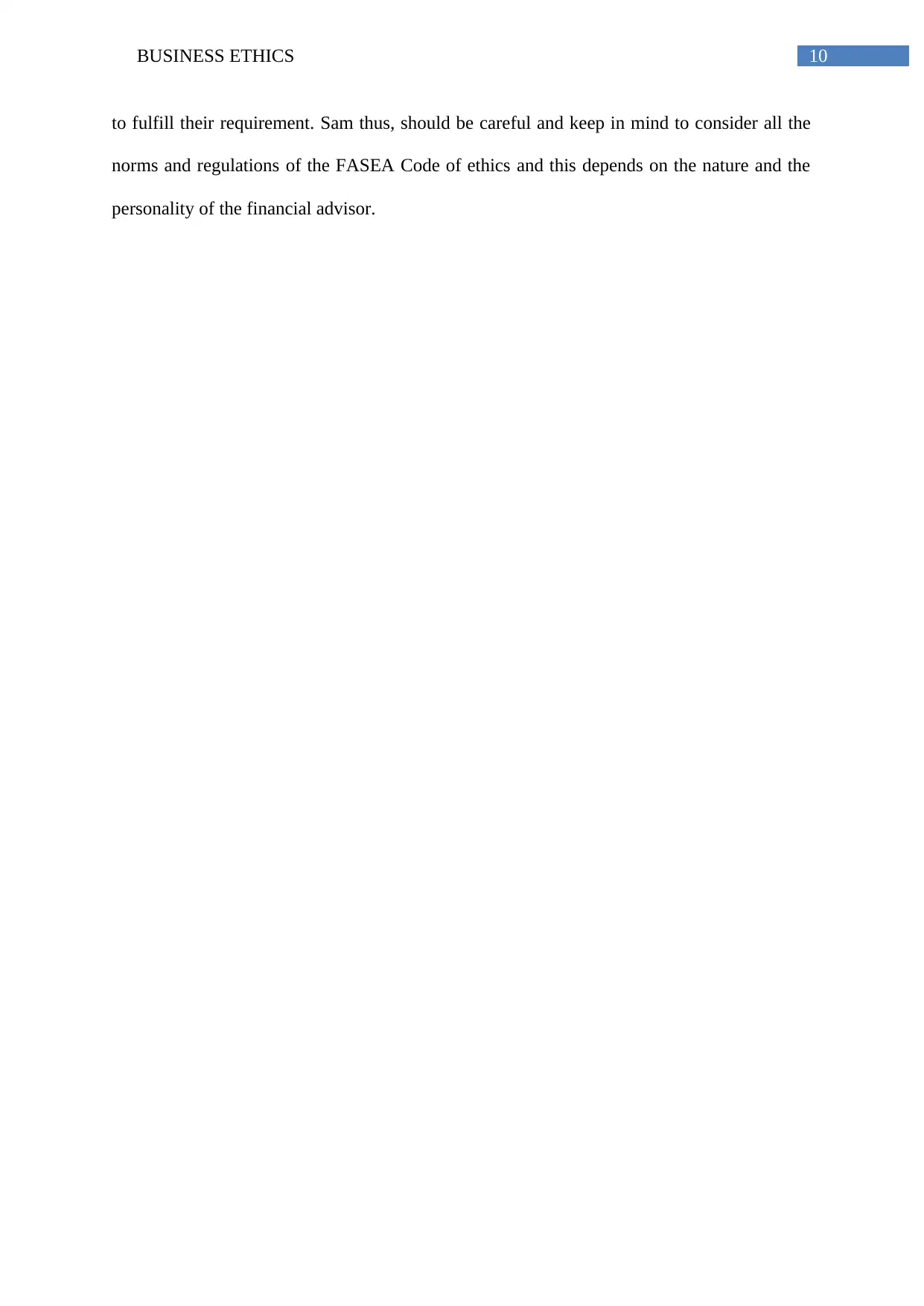
10BUSINESS ETHICS
to fulfill their requirement. Sam thus, should be careful and keep in mind to consider all the
norms and regulations of the FASEA Code of ethics and this depends on the nature and the
personality of the financial advisor.
to fulfill their requirement. Sam thus, should be careful and keep in mind to consider all the
norms and regulations of the FASEA Code of ethics and this depends on the nature and the
personality of the financial advisor.
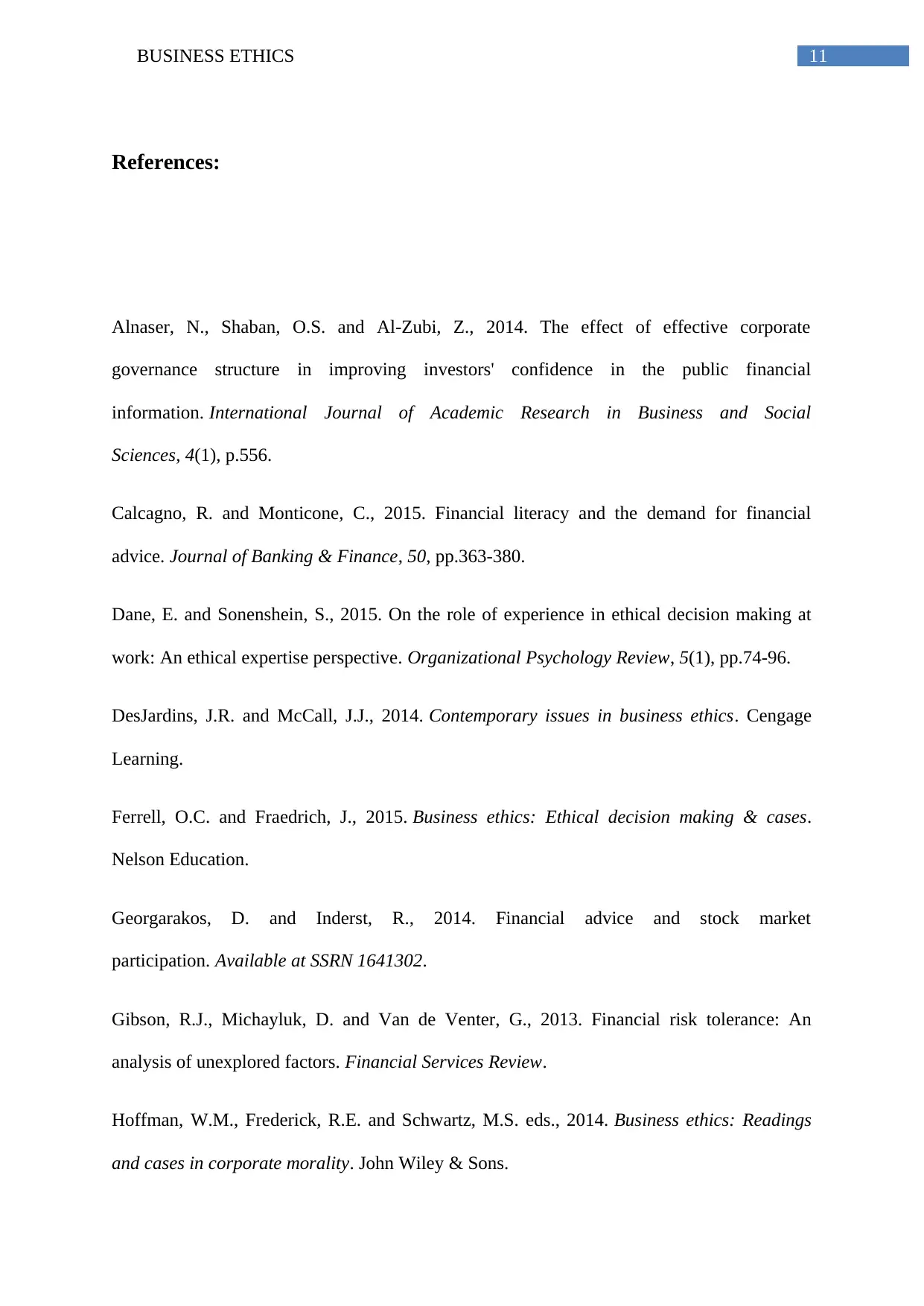
11BUSINESS ETHICS
References:
Alnaser, N., Shaban, O.S. and Al-Zubi, Z., 2014. The effect of effective corporate
governance structure in improving investors' confidence in the public financial
information. International Journal of Academic Research in Business and Social
Sciences, 4(1), p.556.
Calcagno, R. and Monticone, C., 2015. Financial literacy and the demand for financial
advice. Journal of Banking & Finance, 50, pp.363-380.
Dane, E. and Sonenshein, S., 2015. On the role of experience in ethical decision making at
work: An ethical expertise perspective. Organizational Psychology Review, 5(1), pp.74-96.
DesJardins, J.R. and McCall, J.J., 2014. Contemporary issues in business ethics. Cengage
Learning.
Ferrell, O.C. and Fraedrich, J., 2015. Business ethics: Ethical decision making & cases.
Nelson Education.
Georgarakos, D. and Inderst, R., 2014. Financial advice and stock market
participation. Available at SSRN 1641302.
Gibson, R.J., Michayluk, D. and Van de Venter, G., 2013. Financial risk tolerance: An
analysis of unexplored factors. Financial Services Review.
Hoffman, W.M., Frederick, R.E. and Schwartz, M.S. eds., 2014. Business ethics: Readings
and cases in corporate morality. John Wiley & Sons.
References:
Alnaser, N., Shaban, O.S. and Al-Zubi, Z., 2014. The effect of effective corporate
governance structure in improving investors' confidence in the public financial
information. International Journal of Academic Research in Business and Social
Sciences, 4(1), p.556.
Calcagno, R. and Monticone, C., 2015. Financial literacy and the demand for financial
advice. Journal of Banking & Finance, 50, pp.363-380.
Dane, E. and Sonenshein, S., 2015. On the role of experience in ethical decision making at
work: An ethical expertise perspective. Organizational Psychology Review, 5(1), pp.74-96.
DesJardins, J.R. and McCall, J.J., 2014. Contemporary issues in business ethics. Cengage
Learning.
Ferrell, O.C. and Fraedrich, J., 2015. Business ethics: Ethical decision making & cases.
Nelson Education.
Georgarakos, D. and Inderst, R., 2014. Financial advice and stock market
participation. Available at SSRN 1641302.
Gibson, R.J., Michayluk, D. and Van de Venter, G., 2013. Financial risk tolerance: An
analysis of unexplored factors. Financial Services Review.
Hoffman, W.M., Frederick, R.E. and Schwartz, M.S. eds., 2014. Business ethics: Readings
and cases in corporate morality. John Wiley & Sons.
⊘ This is a preview!⊘
Do you want full access?
Subscribe today to unlock all pages.

Trusted by 1+ million students worldwide
1 out of 13
Related Documents
Your All-in-One AI-Powered Toolkit for Academic Success.
+13062052269
info@desklib.com
Available 24*7 on WhatsApp / Email
![[object Object]](/_next/static/media/star-bottom.7253800d.svg)
Unlock your academic potential
Copyright © 2020–2026 A2Z Services. All Rights Reserved. Developed and managed by ZUCOL.



